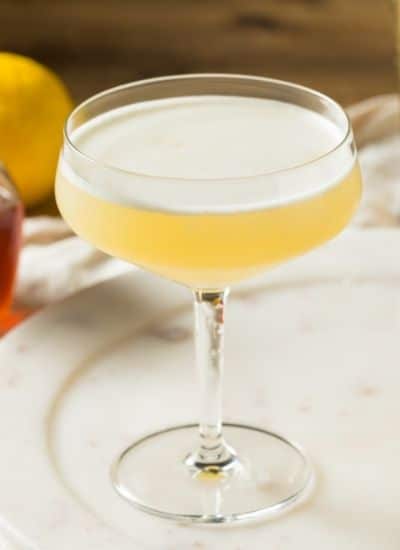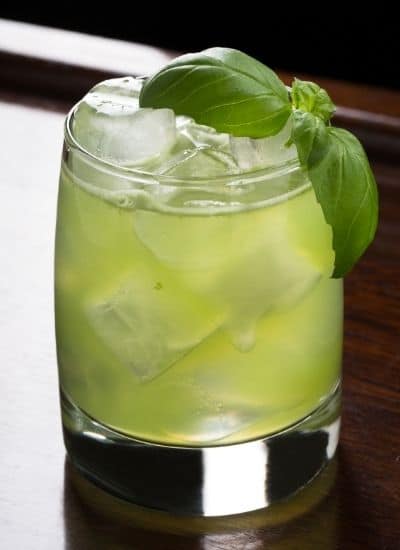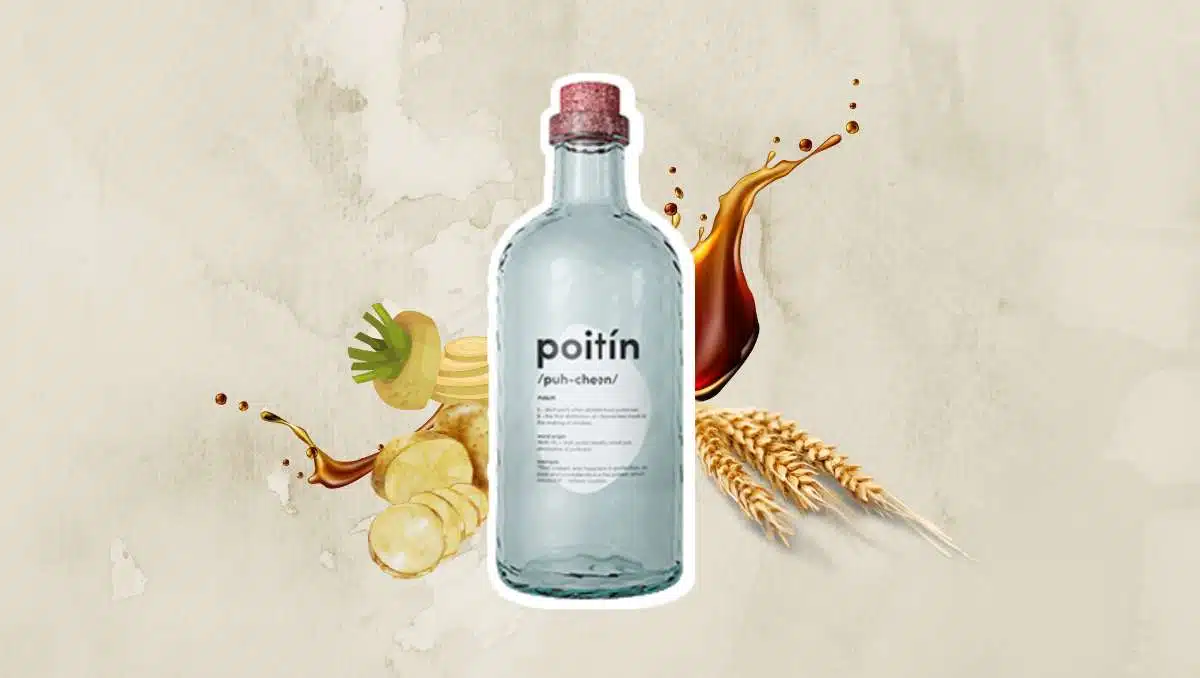Poitín (pronounced "puh - cheen") is an unaged distilled spirit from Ireland, commonly made of potatoes, cereals, or grain. Its alcohol content ranges from 40% ABV up to 90% ABV. The name is most likely related to either the Irish words pota or póit.
Poitín often has a bready aroma with hints of aniseed and a subtle sweetness. It has an oily texture, high viscosity, and tastes slightly grainy with hints of sweet caramel and toffee.
“Irish Poteen/Irish Poitín” has an infamous history in Ireland, having gained somewhat of a notorious reputation for being an illicit spirit. It has been distilled since the early 1600s and is also known under other terms like "Irish Moonshine." However, even though Poitín has such a long tradition, the spirit is not very recognized outside Ireland. One reason is that it was illegal to produce Poitín since 1661. The law changed in 1997, and Poitín was finally legal again.
Since then, many brands ahead and started producing Irish Moonshine again.
What is Poitín?
Poitín is a distilled spirit commonly made of potatoes, cereals, or grain. It must contain at least 40% ABV but can have up to a whopping 90%. The name is said to be a reference to either the Irish words pota or póit. Pota means small pott and refers to the small-batch production typically done with the help of small pot stills.
Póit, on the other hand, is the Irish word for a hangover. I guess I don't have to explain why this could be a possible name-giver. It makes even more sense when taking into account that the spirit can contain up to 90% ABV and that people usually produced it in private.
Today, there's a modern and English version of the name - poteen. And on bottles, you can even find other interpretations like "potcheen", with the latter being closest to the way to pronounce it: puh - cheen.
How does it taste
The taste of Poitín depends a bit on what it's made from. Made from grains, it has a subtle grainy taste with a distinct sweet note that reminds me of caramel and toffee. In the nose, you often get bready notes paired with sweetness.
Poitín made from potatoes, beets, or molasses tends to be even sweeter with less grainy notes. Illegally distilled products of inferior quality can also taste really awful and often contain a high proportion of methanol, which may even be toxic.
Therefore, we highly recommend enjoying only officially produced potcheen and avoiding self-distilled spirits.
History of Poitín
In the 1600s, Poitín mostly got distilled for private use only. And when King Charles the 2nd introduced a levy on spirits in Ireland in the mid-1600s, the Irish producers tried to find ways to avoid it.
Initially, the amount produced was taxed, so people hid large quantities of Poitín in their cellars. That led to a tax depending on the pot size of their stills. So they used smaller pots and let the stills run 24/7. And eventually, the King declared Poitín illegal in 1661. From then on, all private distilleries suddenly were forbidden.
The first legal Poitín from the 20th century emerged in 1987. Oliver Dillon, owner of a distillery in County Clare, had an exclusive license to distill the traditional Irish Moonshine. There was only one condition. The product could not be sold in Ireland but had to be exported. It took ten more years, until 1997, for the law to finally get revised. Since then, selling Poitín was legal again also within Ireland.
As a surprising fact, this only applies to Ireland - not to Northern Ireland. In Northern Ireland, Poitín production and Sales remain illegal.
Poitín today
From the time of legalization, it took quite a while until distilleries tried to bring back the traditional spirit. But in the past years, some renowned brands released several premium Poitín. Stuff you should certainly give a try. Among those high-quality releases are products from Teeling, Bán, Micil, Bunratty (Oliver Dillon), and Glendalough.
And this is only the beginning. In 2008, Poitín received a GI - Geographical Indication. That means only products produced on the Green Island are allowed to call themselves Poitín. And also, the Irish government set up strict regulations to ensure that only quality Poitín is released. It seems this may be just the beginning of a gigantic comeback of a once-forgotten spirit. So, if you are curious and want to try the Irish Moonshine, heat to our recommendations for the best Poitín to try.
How to make Poitín
The process to make Poitín is defined by Irish law and includes the following steps, of which the first three must take place in Ireland:
- Brewing: The actual brewing process varies based on the ingredients used. The final result is a balanced fermentation product that contains fermentable sugars.
- Fermentation: Yeast is added at the start of the fermentation process and helps to convert the fermentable sugars into alcohol. The resulting low-ABV liquid is called wash.
- Distillation: Poitín is traditionally distilled using small pot stills. To keep the distinct character of the spirit, no further treatments like charcoal filtering are allowed. -The strength after distillation must be below 94.7% ABV.
- Bottling: The last step is the only one that can happen outside Ireland. That rarely happens as the regulations for off-shore bottling are very strict, and the companies must control and verify the process.
What is it made from?
Traditional Poitín is made from either potatoes or whey. There are rumors that you could use anything, but that is untrue. The technical regulations set by the Irish government only allow Poitín from:
- Cereals
- Grain
- Whey
- Sugar beet
- Molasses
- Potatoes
How to drink Poitín
As with most Moonshine, you typically drink Poitín straight at room temperature. However, due to the high amount of alcohol, it became increasingly fashionable to use it in cocktail recipes.
As the spirit can be made from many different ingredients, it is a fascinating category. No two Poitíns will taste the same. Every product has its distinct taste, which you need to discover to unfold its full potential.
When drinking very high-proof Poitín, you typically water it down by adding a splash of water or serving it on the rocks. That not only reduces the alcohol levels but also unfolds more of its flavors.
The new and upcoming Poitín brands try to establish a set of recipes to showcase how the spirit can and should be incorporated.
Poitín in cocktails
Poitín cocktails often substitute gin or vodka for Poitín. That works pretty well and creates a new drinking experience because the clear and unaged spirit has a distinct taste. -And it has significantly more flavor than vodka.
So by using Poitín, you get a twist on a classic Gin cocktail. Two prime examples of that are the recipes below. - The Poitín Bee's Knees and Poitín Basil Smash.
Poitín Bee's Knees

Ingredients:
- 2 oz Poitín
- 0.75 oz Lemon juice
- 0.5 oz Honey mix (1 part water, 3 parts honey)
Pour all ingredients into a cocktail shaker with plenty of ice. Shake until the cocktail is well-chilled, then strain it into a coupe glass. Garnish it with a lemon peel or a honeycomb.
Poitín Basil Smash

Ingredients:
- 2 oz Poitín
- 0.75 oz Honey mix (1 part water, 2 parts honey)
- 0.75 oz lemon juice
- 10 basil leaves
Add the basil leaves and lemon juice into a cocktail shaker and muddle them. Be sure to muddle them well to release enough of the beautiful basil flavor.
Then add the remaining ingredients and ice to the shaker and start shaking. Once the drink is chilled, strain it over ice into a rocks glass and garnish with fresh basil leaves.
FAQs
Conclusion
Ireland is famous for its alcoholic creations. Just think of the beloved Irish Whisky, Irish cream, and Guinness. Poitín is probably the Irish spirit you were least familiar with. However, it is an intriguing category of spirits with a unique flavor profile and fascinating history.
Related Articles
- Vodka vs. Gin - What is the difference?
- What is Korn? The traditional grain spirit from Germany
- How to make bacon fat-washed bourbon

